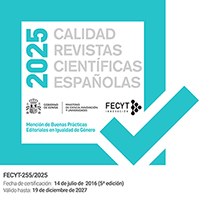La educación en Almagro en el siglo XVIII
DOI:
https://doi.org/10.5944/etfiv.15.2002.3431Abstract
Se trata de un trabajo donde se analiza la enseñanza primaria y superior en el siglo XVIII, en una ciudad tan singular, como lo fue Almagro en esta centuria, donde llegó a ser la capital de la provincia de la Mancha. El trabajo está realizado, especialmente, en base a la documentación existente en el Archivo Histórico Municipal de Almagro, estudiándose la situación de la enseñanza primaria religiosa y seglar, así como la superior y universitaria. La enseñanza primaria religiosa estuvo dirigida básicamente por los jesuítas, que trataron pronto de sustraerse a la obligación contraída con el Ayuntamiento, cuando llegaron a Almagro; Íes relevaron en dicha obligación los hermanos hospitalarios de San Juan de Dios, que estaban muy necesitados de ayuda económica, por lo que aceptaron regentar las escuelas primarias. La enseñanza seglar estuvo a cargo de maestros, que en la mayoría de los casos ejercían sin titulación alguna, generando un evidente intrusismo profesional. En el último cuarto del siglo XVIII, con la aparición de maestros con titulación expedida por el Consejo de Castilla, se abrió un duro pleito entre unos y otros que se saldó en favor de los titulados, aunque siguieron funcionando las escuelas de maestros sin titulación. Por último se estudia la situación de los preceptores de Latinidad y Gramática, que preparaban a los alumnos para ingresar en las universidades españolas, así como la situación que padeció la Universidad de Almagro en el siglo xviii, en evidente proceso de decadencia, como otras muchas universidades menores.
It is a question of a work where the elementary and most top education is analyzed in the 18th century, in so singular city, since it it (he, she) was Almagro in this century, where it managed to be the capital of the province of the la Mancha. The work is realized made, specially, on the basis of the existing documentation in the Historial Municipal File of Almagro, being studied the situation of the religious and secular elementary education, as well as Superior and university student. The religious elementary education was directed basically by the Jesuits, who tried to avoid each other soon the obligation contracted with the Town hall, when they came to Almagro; they were relieved in the above mentioned obligation by the hospitable brothers of God's San Juan, who were very needed of economic aid, for what they agreed to mange the primary schools. The secular education was a the expense of teachers, who int the mayority of the cases were practising without any qualifications, generating an evident practising professionally without qualifications. Finally, there is studied the situation of the teachers of Latinidad and Grammar, which they were preparing to the pupils to join the Spanish universities, as well as the situation that endured the University of Almagro in the 18th century, in evident process of decadence, as other many minor universities.
Downloads
Downloads
Published
How to Cite
Issue
Section
License
Los autores que publican en esta revista están de acuerdo con los siguientes términos:
- Los autores conservan los derechos de autor (copyright) de las obras publicadas y garantizan a la revista el derecho de ser la primera publicación del trabajo al igual que permiten la reutilización del mismo bajo la licencia de uso indicada en el punto 2.
- Las obras se publican en la edición electrónica de la revista bajo bajo una licencia Creative Commons Reconocimiento-NoComercial 4.0 Internacional, que permite a otros compartir el trabajo con un reconocimiento de la autoría del trabajo y de la publicación inicial en esta revista. Se pueden copiar, usar, difundir, transmitir y exponer públicamente, siempre que: i) se cite la autoría y la fuente original de su publicación (revista, editorial y URL de la obra); ii) no se usen para fines comerciales.
- Se permite y se anima a los autores a difundir electrónicamente las versiones pre-print (versión antes de ser evaluada) y/o post-print (versión evaluada y aceptada para su publicación) de sus obras antes de su publicación, ya que favorece su circulación y difusión más temprana y con ello un posible aumento en su citación y alcance entre la comunidad académica (por ejemplo, en repositorios institucionales o en su propio sitio web). Color RoMEO: verde. (Véase The Effect of Open Access) (en inglés).
Authors who publish in this journal agree to the following terms:
- Authors retain copyright and grant the journal right of the first publication with the work simultaneously licensed under a license Creative Commons Reconocimiento-NoComercial 4.0 Internacional that allows others to share the work with an acknowledgement of the work's authorship and initial publication in this journal.
- Authors are able to enter into separate, additional contractual arrangements for the non-exclusive distribution of the journal's published version of the work (e.g., post it to an institutional repository or publish it in a book), with an acknowledgement of its initial publication in this journal.
- Authors are permitted and encouraged to post their work online (e.g., in institutional repositories or on their website) prior to and during the submission process, as it can lead to productive exchanges, as well as to earlier and greater citation of the published work (See The Effect of Open Access).









